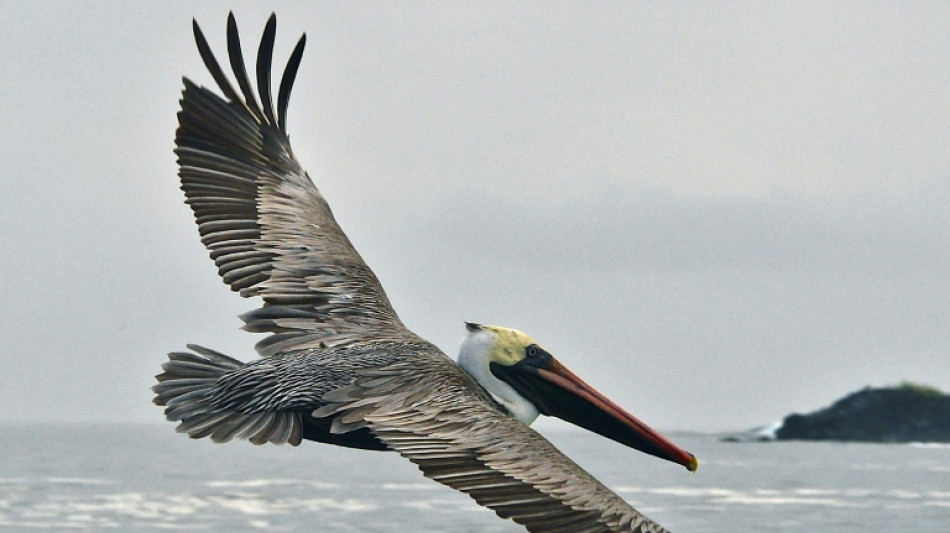
-
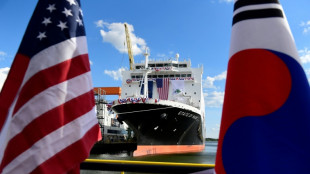 China suspends 'special port fees' on US vessels
China suspends 'special port fees' on US vessels
-
US senators take major step toward ending record shutdown

-
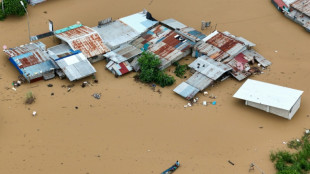 Typhoon Fung-wong leaves flooded Philippine towns in its wake
Typhoon Fung-wong leaves flooded Philippine towns in its wake
-
From Club Med to Beverly Hills: Assinie, the Ivorian Riviera
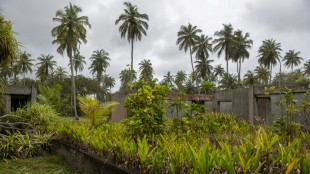
-
 The 'ordinary' Arnie? Glen Powell reboots 'The Running Man'
The 'ordinary' Arnie? Glen Powell reboots 'The Running Man'
-
Typhoon exposes centuries-old shipwreck off Vietnam port
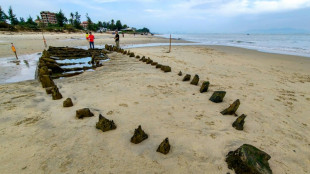
-
 French court to decide if ex-president Sarkozy can leave jail
French court to decide if ex-president Sarkozy can leave jail
-
China lifts sanctions on US units of South Korea ship giant Hanwha
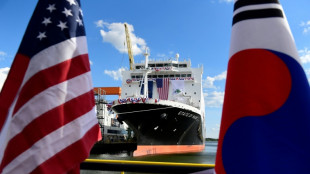
-
 Japan death row inmate's sister still fighting, even after release
Japan death row inmate's sister still fighting, even after release
-
Taylor sparks Colts to Berlin win as Pats streak hits seven

-
 Dreyer, Pellegrino lift San Diego to 4-0 MLS Cup playoff win over Portland
Dreyer, Pellegrino lift San Diego to 4-0 MLS Cup playoff win over Portland
-
Indonesia names late dictator Suharto a national hero

-
 Fourth New Zealand-West Indies T20 washed out
Fourth New Zealand-West Indies T20 washed out
-
Tanzania Maasai fear VW 'greenwashing' carbon credit scheme
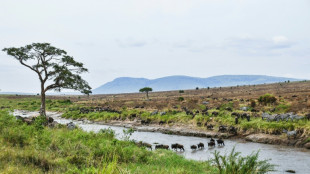
-
 Chinese businesswoman faces jail after huge UK crypto seizure
Chinese businesswoman faces jail after huge UK crypto seizure
-
Markets boosted by hopes for deal to end US shutdown

-
 Amazon poised to host toughest climate talks in years
Amazon poised to host toughest climate talks in years
-
Ex-jihadist Syrian president due at White House for landmark talks

-
 Saudi belly dancers break taboos behind closed doors
Saudi belly dancers break taboos behind closed doors
-
The AI revolution has a power problem

-
 Big lips and botox: In Trump's world, fashion and makeup get political
Big lips and botox: In Trump's world, fashion and makeup get political
-
NBA champion Thunder rally to down Grizzlies

-
 US senators reach deal that could end record shutdown
US senators reach deal that could end record shutdown
-
Weakening Typhoon Fung-wong exits Philippines after displacing 1.4 million
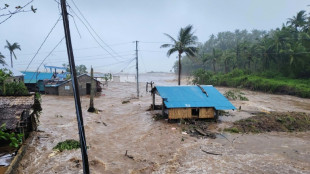
-
 Lenny Wilkens, Basketball Hall of Famer as player and coach, dies
Lenny Wilkens, Basketball Hall of Famer as player and coach, dies
-
Empire Metals Limited - Speaking at TZMI Congress

-
 Sir Dave Lewis Appointed Diageo plc CEO
Sir Dave Lewis Appointed Diageo plc CEO
-
Griffin wins PGA Mexico title for third victory of the year

-
 NFL makes successful return to Berlin, 35 years on
NFL makes successful return to Berlin, 35 years on
-
Lewandowski hat-trick helps Barca punish Real Madrid slip

-
 George warns England against being overawed by the All Blacks
George warns England against being overawed by the All Blacks
-
Lewandowski treble helps Barca beat Celta, cut gap on Real Madrid

-
 Neves late show sends PSG top of Ligue 1, Strasbourg down Lille
Neves late show sends PSG top of Ligue 1, Strasbourg down Lille
-
Inter go top of Serie A after Napoli slip-up

-
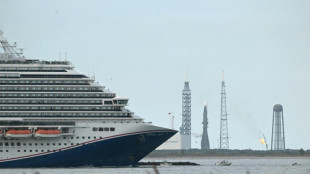 Bezos's Blue Origin postpones rocket launch over weather
Bezos's Blue Origin postpones rocket launch over weather
-
Hamilton upbeat despite 'nightmare' at Ferrari

-
 Taylor sparks Colts to Berlin win, Pats win streak hits seven
Taylor sparks Colts to Berlin win, Pats win streak hits seven
-
Alcaraz and Zverev make winning starts at ATP Finals

-
 Protests suspend opening of Nigeria heritage museum
Protests suspend opening of Nigeria heritage museum
-
Undav brace sends Stuttgart fourth, Frankfurt win late in Bundesliga

-
 Roma capitalise on Napoli slip-up to claim Serie A lead
Roma capitalise on Napoli slip-up to claim Serie A lead
-
Liverpool up for the fight despite Man City masterclass, says Van Dijk

-
 Two MLB pitchers indicted on manipulating bets on pitches
Two MLB pitchers indicted on manipulating bets on pitches
-
Wales rugby captain Morgan set to be sidelined by shoulder injury

-
 After storming Sao Paulo podium, 'proud' Verstappen aims to keep fighting
After storming Sao Paulo podium, 'proud' Verstappen aims to keep fighting
-
US flights could 'slow to a trickle' as shutdown bites: transport secretary
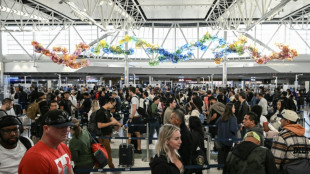
-
 Celtic close on stumbling Scottish leaders Hearts
Celtic close on stumbling Scottish leaders Hearts
-
BBC chief resigns after row over Trump documentary

-
 Norris extends title lead in Sao Paulo, Verstappen third from pit-lane
Norris extends title lead in Sao Paulo, Verstappen third from pit-lane
-
Norris wins in Sao Paulo to extend title lead over Piastri


How tackling invasive species on land can spark 'stunning' improvements at sea
Restoring islands devastated by invasive species and helping coastal "connectors" like seabirds boosts nature on land and at sea -- and may be a new way to increase resilience to climate change, researchers said Monday.
A group of experts and scientists from across the world reviewed thousands of studies to build a picture of island health to map out new strategies for protecting their often unique and threatened species.
They found that removing invasive species and restoring island ecosystems on land can also have significant benefits to underwater environments.
That is largely thanks to the role played by "connector species" such as seabirds, seals and land crabs, which transfer nutrients from oceans to islands and vice versa, said the paper, published in Proceedings of the National Academy of Sciences.
The report comes as delegates for nearly 200 countries prepare to tease out a new blueprint to save nature from destruction wrought by humans, including key proposals for preserving 30 percent of land and sea, and bringing indigenous rights to the centre of conservation.
Paper co-author Penny Becker of Island Conservation said that while indigenous island communities have known for generations the intricate links between healthy ecosystems on land and in the sea, Western conservation was "just catching up".
"Carefully chosen conservation actions on islands can lead to really stunning changes in the neighbouring ocean ecosystem, because everything is connected," she said.
For example, seabirds catch their prey in the seas and then deposit nutrients back on the islands in the form of guano.
Evidence shows islands with high seabird populations usually have larger populations of fish, as well as faster-growing and more climate-resilient coral reefs, the researchers said.
But seabird populations across the world have plummeted, with the introduction on islands of non-native mammals -- like rats that plunder nests to eat eggs and hatchlings -- by human activity driving some bird species to local or global extinction.
Loss of these connector species populations "often results in ecosystem collapse–both on land and in the sea", the authors said.
- 'Profound' impacts -
On Floreana island in the Galapagos, invasive species have devastated not just bird and plant species, but also livelihoods, with farmers losing up to 100 percent of their crops due to invasive rats that started to spread on the island, according to Karl Campbell from Re:Wild, which was also involved in the paper.
Some 13 species have gone locally extinct on the main island, he said, while 54 species are critically endangered, endangered or threatened.
The island, which is almost entirely a national park, eradicated invasive pigs in the 1980s in a bid to save the critically endangered seabird the Galapagos petrel, and then in 2019 non-native goats were removed, leading to a regrowth in local vegetation.
The 10-year battle to rid the island of rats continues, Campbell said in a briefing.
Once they are gone, at least a dozen species that went locally extinct largely because of invasive species will be returned to the island, including giant tortoises and mockingbirds.
The island is part of a new environmental campaign called the Island-Ocean Connection Challenge, which aims to restore and rewild at least 40 globally significant island ecosystems to benefit islands, oceans and communities by 2030.
"With the current triple crisis of climate change, biodiversity loss, and human wellbeing, we need to be using all the tools in the toolbox," Campbell said.
This approach could also boost climate change resilience in the Galapagos, where increasingly intense El Nino events cause warm waters to replace cold nutrient-rich waters -- starving species like penguins, marine iguanas and seabirds and causing corals to bleach.
Restoration and rewilding could have "extremely profound" impacts, Campbell said, with healthy populations of connector species able to transfer some of the lost nutrients to the water and encouraging plankton growth, potentially easing the effects of the El Ninos.
"What we may have here is an overlooked tool for maximising ocean health and resilience," he added.
L.Miller--AMWN
